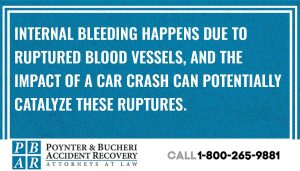
Symptoms of Internal Bleeding After a Car Accident

The force generated in vehicle collisions can cause victims to suffer many different kinds of injuries, ranging anywhere from mild to fatal. Many of these injuries are immediately apparent – you’ll certainly notice a serious laceration or another external injury after your accident.
Unfortunately, you may not notice if you’ve suffered from an internal injury, such as internal bleeding. This type of injury usually requires imaging services to diagnose, such as an MRI, X-ray, or CT scan.
While it can be difficult to detect, internal bleeding is incredibly serious. If you suspect that you’ve suffered from this injury, you should seek immediate emergency care. Internal bleeding can have fatal consequences within only a few hours.
For that reason, it’s important to be on the lookout for symptoms of internal bleeding. If you display symptoms, you must call 911 immediately to receive emergency care.
Symptoms of Internal Bleeding

If you’ve just suffered from an accident, it’s important to assess your physical condition in case you require emergency medical attention. This is especially important when it comes to life-threatening injuries, such as spinal cord injuries, traumatic brain injuries, and excessive internal bleeding.
There are many symptoms of internal bleeding after a car accident that you should know, including:
- Severe bruising or swelling: Noticeable bruising or swelling can indicate an internal injury. It’s especially concerning if these symptoms occur around the abdomen.
- Nausea or vomiting: Car accidents can cause nausea and vomiting for different reasons, such as traumatic brain injury and whiplash. These symptoms can indicate that there’s blood in your stomach from internal injuries and bleeding.
- Pain: Pain may indicate that you’ve suffered internal bleeding, especially if you experience serious pain or tenderness in the abdominal region.
- Weakness: Losing blood from internal injuries can cause you to feel weak and lightheaded.
- Elevated heartbeat: Blood loss from internal bleeding can cause your heart rate to increase.
- Serious headache: A headache may indicate that you’ve suffered from internal bleeding in your head. You may also have a traumatic brain injury.
- Thirst: Losing a great deal of blood means you’re also losing vital fluids, which can cause you to become thirsty.
- Confusion: Internal bleeding can impact the amount of blood flowing to your brain, especially if you suffered trauma to the head. This can cause confusion as well as blurred vision, disorientation, and dizziness.
- Feeling cold: You may feel cold if your body goes into hypovolemic shock, which is fatal when left untreated. Your body’s reduced blood flow may also lower your internal temperature.
- Pale skin: Losing large amounts of blood will cause your skin to turn pale, and your skin may feel clammy.
- Blood in urine: You may experience blood in your urine if you suffer kidney damage or damage to other parts of the urinary system.
Call 911 if you display any of these symptoms or another sign that you’ve suffered a serious or life-threatening injury.
Further, because some car accident injuries don’t display immediate symptoms, you should see a doctor as soon as possible even if you don’t show signs of an injury. You could have suffered severe injuries that are not yet apparent, and delaying treatment can cause further damage.
Types of Internal Injuries After a Car Accident

Internal bleeding happens due to ruptured blood vessels, and the impact of a car crash can potentially catalyze these ruptures.
In addition to bursting vessels directly, a collision may damage a victim’s organs and other parts of their anatomy, possibly resulting in internal injuries and bleeding.
Common types of injuries after a collision include:
- Kidney damage
- Liver damage
- Ruptured spleens
- Broken ribs and other fractures
- Chest injuries
- Traumatic brain injuries
- Spinal cord injuries
Medical Treatment for Internal Bleeding
As we’ve discussed, you must receive medical treatment if you suffer from internal bleeding or another injury after your accident. If you suffer from internal bleeding, you’ll likely require extensive medical care.
It’s common for those who experience severe internal bleeding from car accidents to need blood transfusions. Medical professionals may also perform surgery to stop the bleeding, resuscitate fluids, and address what may have caused the bleeding in the first place. For instance, surgeons may need to repair or mitigate damage to organs, like the kidneys or liver.
From there, car accident victims may need to receive subsequent treatments for their internal injuries and bleeding. This ongoing care could include prescriptions, doctor appointments, physical therapy, and additional costly treatments.
Contact an Indianapolis Car Accident Lawyer
Receiving medical care after a crash is usually expensive, and you shouldn’t have to pay for your injuries if they result from another driver’s negligence. Fortunately, you can file a claim against the at-fault driver’s insurance to recover damages.
Depending on your case, you may be able to recover compensation for:
- Vehicle repair costs
- Past and future medical bills
- Lost wages
- Loss of future earnings
- Pain and suffering
To ensure you get the most money from your claim, you should work with an experienced car accident attorney to assist you with your case.
For car accident lawyers in Indiana, call Poynter & Bucheri Accident Recovery Attorneys at Law. You can schedule a FREE case review with our team today online or call 1-800-265-9881.
